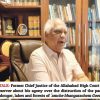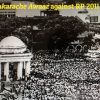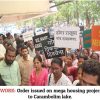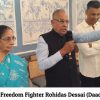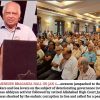Goa is abuzz with excitement as vintage bike and car owners, users, collectors and fans are decking […]

NIZ GOENKAR OR MAHARASHTRAWADI?
Cover Story, Jan 25- Jan 31 2025 January 24, 2025By Rajan Narayan
A controversy has broken out over the commitment of the first chief minister of Goa, Dayanand Bandodkar, to Goan Asmitai. The Goa Forward boss Vijai Sardesai has claimed that Bhausaheb Bandodkar had no commitment to the unique identity of Goa. Chief Minister Dr Pramod Sawant had reacted angrily insisting that Dayanand Bandodkar was deeply committed to Goan asmitai. The CM accused Vijai Sardesai of insulting the legacy of Bhausaheb Bandodkar.
This was in response to Vijai Sardesai’s claim that Bhausaheb made a mistake and harboured an allergy to Goa’s identity. Pramod Sawant has slammed Vijai Sardesai saying “the real problem lies with Vijai Sardesai and his inflated ego.” Vijai Sardesai has retorted “the issue is not about my ego but the CM’s ego. He is getting an ego boast when someone compares him to Bhausaheb.”
The fact remains that Bhausaheb Bandodkar was head of the MGP government which was in favour of the merger of Goa with Maharashtra. During the tenure of Bandodkar as the first chief minister of Goa the Legislative Assembly passed a resolution seeking the merger of Goa with Maharashtra.
The real legacy of Dayanand Bandodkar was liberating Goa from the tyranny of the Hindu and Catholic bhatkar, landlords, and empowering the Bahujan Samaj to promote universal free education…
On the occasion of Goa’s 58 th Republic Day celebration on January 26, 2025 we take pleasure in carrying an excerpt from Rajan Narayan’s book “THE Triumph of Secularism: Battle of the Opinion Poll in Goa”published in 2011 by Goa publications pvt Ltd (Vasco da Gama]….
AFTER ANGRY DEBATE, THE OPPOSITION WALKS OUT (chapter 7]
THE DAY THE RESOLUTION to merge Goa with Maharashtra was moved in the Goa Legislative Assembly, unprecedented measures were taken. In fact, a day before the resolution was scheduled to be moved, the Speaker had ordered the cancellation of passes to the visitor’s gallery for the following day in anticipation of protests. This was done apparently because the Legislative Assembly did not have any security staff at that the time.
The session on January 22, 1965, began with controversy. As soon as the Speaker called Private Member’s Business Resolution No. 15 by P.S. Naik, the opposition objected. They argued that, according to the rules, a private resolution could be called only if 12 days notice was given to the government and the resolution would be demanded through ballot. Dr Sequeira the move saying he did not have faith in the ballot as the House was not informed of it and, therefore, the ballot would not be held in a proper manner. Rather than postponing the resolution for 12 days, the Speaker said procedures would be followed in the future. The Opposition expressed no confidence in the Speaker, who gave his ruling and outlined the procedure to discuss the resolution.
Dr. Sequeira protested saying the resolution was ‘ultra virus’ the Union Territories Act. He pointed out that the resolution proposed “something which is to kill the House” and added that the resolution went against the very oath they had taken when they became members of the Legislative Assembly, which was: “I… having been elected a member of the Legislative Assembly of … solemnly affirm that I will bear true faith and allegiance to the Constitution of India as by law established, that I will uphold the sovereignty and integrity of India and that I will faithfully discharge the duty upon which I am about to enter.”
The Speaker had responded that the resolution would have been unconstitutional only if it had asked for secession of the territory from the Indian nation, rather it recommended integration with another state and was, therefore, intra virus of the Act.
The resolution by P.S. Naik, MLA from Shiroda, was then moved. It stated:
“Whereas, the Constitution of India is based on the principle of democratic system of government, based on adult franchise without any distinction of class, religion, creed or sex and had unequivocally accepted and adopted the party system of government as the best means of subserving the common good;
Whereas, with full realisation of the territory of Goa, Daman and Diu, the former Portuguese settlements in India, constitute an integral part of India and that the people of the said territory were eagerly looking forward to their liberation from the colonial regime and to unite with mother country, the said territory was liberated with a view to enable its people to unite themselves with the rest of India;
Whereas, as a purely transitional measure to deal with problems, the newly liberated territories were constituted as a union territory under direct administration of the central government which, with commendable speed, made arrangements for holding elections in the territory in accordance with the Constitution of India;
Whereas, in the said elections the various political parties contested the seats on definite issues and the party which ultimately won the majority of seats and was called upon to form the popular government, fought the elections on the definite and specific issue that the best interests of the people of this territory lay in its merger of Goa with the adjoining state of Maharashtra and Daman and Diu with Gujarat;
Whereas the party which stood for a separate state for Goa, failed to get the majority while the party which stood for retaining the status of union territory got no seat at all except one in Daman;
Whereas this House considers that having regard to all the respected principles of the democracy and the elections, the success of a party in the election son a proclaimed policy invariably means that the said policy is the one accepted by the people and must be given effect to;
Whereas the House considers that the retention of this territory as a union territory involves very huge and unnecessary expenditure on the paraphernalia of a top heavy administration which is a totally wasteful expenditure to no purpose;
Whereas the principle of formation of sates on a linguistic basis has been accepted and put into practice whereas this area is predominantly populated by the people with their mother tongue as Marathi or its dialect Konkani;
Whereas, geographically, culturally and historically this territory has been intimately connected with territories forming part of the Maharashtra state;
Whereas the non-fulfilment of the promise held out of the people of this territory at the time of the elections by the party which has returned with a mandate has given rise to discontentment among the people;
Whereas the delay in bringing about the said merger of Goa with Maharashtra and Daman and Diu with Gujarat is frittering away the energies of the people thereby precluding them from concentrating on the developmental activities and that by postponing the merger for a longer period, the developmental activities will be seriously jeopardised;
And whereas, such merger is not only in the best interests of the union territory of Goa, Daman & Diu, but also of the nation as a whole, and that such merger will promote feelings of national solidarity and integrity;
Now, therefore, the House of elected representatives of Goa, Daman and Diu is of the considered opinion that the territory of Goa should without any further delay be merged with the adjoining state of Maharashtra and the territories of Daman and Diu, should be merged with Gujarat. This House, accordingly, recommends to the Government of India to take appropriate steps in this regard by sponsoring the necessary legislation in the Parliament immediately.”
Immediately responding to the resolution, Margao MLA, V.N. Sarmalkar asked by what authority the House felt it had the privilege of discussing a matter which interfered with other states. The Speaker retorted that it was a voluntary suggestion. Orlando Sequeira Lobo asked if the resolution was moved because the government found itself inefficient to rule the territory and, if that were so, it must resign. Still trying to point out the ‘illegality’ of moving the resolution, Dr. Sequeira pointed out to Rule No. 3 regarding the conditions of admissibility of resolutions. The rule stated that resolutions should not contain arguments, inferences, ironical expressions, imputations or defamatory statements. He pointed out that the statement claiming the area “is predominantly populated by the people with their mother tongue as Marathi or its dialect Konkani” was defamatory. The Speaker, not surprisingly, ruled that it was not defamatory, but merely an opinion.
Dr Aureliano Loyola Furtado asked if the formation of a union territory could be termed a ‘transitory measure’. He also pointed out that resolutions were to be moved in public interest. Since the MGP had only managed to secure 1,00,119 votes in the elections, he averred that merger was a matter of interest only for a certain group. Enio Pimenta pointed out to Clause 5 of the Union Territories Act which stated that the Legislative Assembly, unless dissolved, could continue for five years. It was for the administrator to decide on dissolution. He pointed out that the move for merger implied dissolving the Assembly.
Dr Furtado suggested a substitute resolution by way of amendment. He suggested that the amendment should include a statement saying that there was no reason to believe that the status of the territory was transitional in nature; that the union government and the late PM Nehru promised the people of the area that their distinct individuality would be maintained by keeping the territory a separate entity; that the government of Union Territories Act only provided a truncated form of democracy, which was a stepping stone for full fledged statehood; that the general elections were fought for the purpose of electing representatives; that the verdict of the elections could not be held inconclusive and their hairline majority lacked the mandate to decide the future political status of the territory; that the only democratic method of ascertaining the wishes of the people was through free and fair means of plebiscite; that the expansionist imperialism of an interested state, backed by a minority of anti-national and anti-Goan elements, sought to drive a wedge between the states of the union, besides fostering divisiveness among the people. Orlando Sequeira moved an amendment to delete the words “unequivocally accepted”, “best” and substitute “subserving the common good” with “conducting administration”.
Speaking in favour of the merger, P.S. Naik reiterated the MGP objective and the people’s mandate. He also said that Goans appreciated Maharashtrian culture and values, which is why they wanted merger. He said that, during the Portuguese regime, few people were their favour and added that the UGP wanted to continue the policy of slavery. He claimed that the UGP was anti-merger because its leaders wanted to retain Portuguese culture. He felt it was time people taught the “so-called intellectuals” basic values and also said he did not understand what ‘Goan’ culture the UGP constantly referred to. Questioning the nationalism of the UGP, he said that those who claimed that Pandit Nehru wanted Goa to remain a territory for the following ten years, had forgotten that Mahatma Gandhi wanted the states to be divided according to language. He claimed that 57,000 children in the state were educated in Marathi, while only 5000 were studying in Konkani medium schools, proving that maximum were in favour of Maharashtra and the state should be merged as per ‘Gandhiji’s’ wishes.
A minister in the MGP government, Tony Fernandes, argued that the poor, oppressed people of Goa would not be protected unless the union territory merged with Maharashtra. Fernandes also pointed out that communal sentiment was on the rise, because of which the minorities were bound to suffer. He stressed that separation would lead to migration of labour and Goa becoming a labour pocket. Fernandes added that if Goa did not merge, it would appear to the Centre that its actions to liberate Goa were not welcome by the local people.
While referring to the claim of Goans as being individual, he said he was sorry Goans were proud of a ‘foreign’ culture that was imposed on them. Even if his culture was to be maintained, it could not be done by keeping the state separate. Fernandes said that there was migration of population and “migrated people may come and rule over us”. He did not understand how the members of the House were satisfied with “C-class citizenship”.
Enio Pimenta retorted that the Constitution of India did not permit separate citizenship and, since all Goans were citizens of India, they could not be called lower class citizens.
Making a case to prove that merger was the only viable option, D.K. Chopdekar said, after liberation, Goa had three options: merger with Maharashtra, Goa as a separate state or merger with Mysore. Chopdekar pointed out that Lal Bahadur Shastri ruled out the possibility of Goa being granted statehood. As a result, Goans had to choose if they’d rather be a part of Maharashtra or Mysore. Chopdekar argued that merger with Maharashtra would make more sense because the state language was Marathi and the spoken language was Konkani! He added that whatever culture that was prevalent in Goa was that of Maharashtra. He also felt another factor that had to be considered was economic viability.
Pointing out the flaws in the MGP leaders’ logic, V.N. Sarmalkar said the Portuguese had also claimed that Goa was a part of Portugal. By this corollary, he said, “Tomorrow even Pakistan will claim its right over Kashmir”. He challenged the claim that Goa was, historically, a part of Maharashtra. He opined that no mention was made of this in textbooks: “All the great leaders of Goa are not mentioned in the history books of Marathi, then how can one say that Goa is historically a part of Maharashtra?” Sarmalkar also informed the house that, out of the 60% Hindus in the state, only 10–15 % of them knew to read and write in Marathi.
After a debate on the time allotted to speak on the resolution, the Opposition staged a walkout. The resolution was put to vote. Thus, the lone member in the house to vote against the resolution was M.R. Jiwani, the MLA from Daman and Diu.
The legislature adopted, by 15 votes to one, the unofficial resolution, urging the government of India to take appropriate steps for merger. As the UGP members walked out hurling charges of partiality and undemocratic, autocratic behaviour, thumping the floor and hurling name plates, steel-helmeted police guarded the streets of Panaji and visitors were not allowed. The debate on the resolution continued till 9 pm: three hours more beyond the scheduled time.
References
- Proceedings of the Goa Legislative Assembly, 1965.
- Free Press, January 23, 1963.


